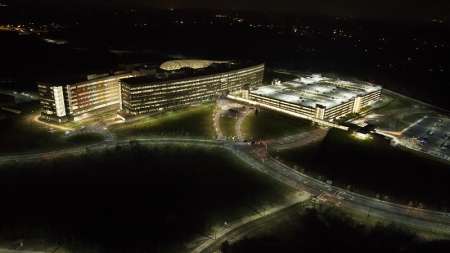The National Geospatial-Intelligence Agency (NGA) plans to focus on automation of sensor exploitation through the use of AI technologies as part of an ambitious plan to invest in AI tech this year, an agency official said on Jan. 30 at MeriTalk’s Accelerate AI Forum in Washington. […]
The National Geospatial-Intelligence Agency (NGA) has launched a new 24/7 operations center to provide geospatial intelligence (GEOINT) to policymakers and military forces, the agency announced on Jan. 24. […]
The National Geospatial-Intelligence Agency (NGA) has awarded four companies a spot on a new $794.1 million multi-vendor contract to support the agency’s research and development (R&D) services and directorate, the GEOINT agency announced on Jan. 26. […]
The National Geospatial-Intelligence Agency (NGA) is soliciting proposals for Luno A, a $290 million contract to acquire unclassified commercial geospatial intelligence (GEOINT) derived computer vision and analytic service capabilities. […]
The director of the National Geospatial-Intelligence Agency (NGA) said today that the agency is facing challenges when it comes to overload in data – a situation that he described as only the “tip of the iceberg” – and suggested that’s where artificial intelligence needs to come into play as a solution. […]
The National Geospatial-Intelligence Agency (NGA) is seeking information from industry on how to upgrade its Stardust program, which develops models of the Earth used for matching GPS coordinates to locations on the ground, according to a recent request for information (RFI). […]
At the Geo-Resolutions Conference – a joint conference between the National Geospatial-Intelligence Agency (NGA) and Saint Louis University on Sept. 28 – experts explored geospatial solutions to help combat climate change and expand the GEOINT workforce in the St. Louis region. […]
The National Geospatial-Intelligence Agency (NGA) has long been the agency for analysis of imagery and maps within the intelligence community (IC), however, agency officials believe that a key part of that mission is the analysis of the written word. […]
Federal agencies are increasingly sharing information with one another with both connected and disconnected applications, while trying to be more security conscious and reevaluating approaches to building software and other tech important for securing the homeland, officials said on July 20. […]
The National Geospatial-Intelligence Agency (NGA) has begun to collaborate with the U.S. Department of State to capture satellite imagery in order to analyze and expose evidence of Russia-perpetrated war crimes and other atrocities in Ukraine. […]
Navy Vice Adm. Frank D. Whitworth III assumed command as the eighth director of the National Geospatial-Intelligence Agency (NGA) during a ceremony held at NGA Campus East on June 3. […]
The National Geospatial-Intelligence Agency (NGA) has partnered with the Oak Ridge National Laboratory to offer public free access to human geography population data, NGA announced. […]
General Dynamics Information Technology (GDIT) said today it won a $4.5 billion User Facing and Data Center Services (UDS) contract from the National Geospatial-Intelligence Agency (NGA). […]
The Senate has confirmed U.S. Navy Vice Adm. Frank D. Whitworth III to serve as the eighth director of the National Geospatial-Intelligence Agency (NGA). […]
President Biden has nominated U.S. Navy Vice Adm. Frank D. Whitworth III to serve as the director of the National Geospatial-Intelligence Agency, the Department of Defense (DoD) announced on Jan. 10. […]
With the United States involved in a great-power competition, the National Geospatial-Intelligence Agency (NGA) is being challenged to provide faster and better products and services for the nation to prevail. But meeting the test in this heightened level of competition, according to NGA CIO Mark Andress, demands more than just speed. […]
The National Geospatial-Intelligence Agency (NGA) has awarded General Dynamics Information Technology (GDIT) a potential 10-year, $4.5 billion contract for IT and data center services. […]
The National Geospatial-Intelligence Agency (NGA) recently released the National System for Geospatial Intelligence (NSG) Enterprise Commercial GEOINT Strategy 2021-2025, calling on the larger GEOINT community to leverage more commercial technologies and methods to help the enterprise move faster and grow stronger. […]
The National Geospatial-Intelligence Agency (NGA) is looking at unclassified data sources to broaden its understanding of climate change – an issue that one NGA official said this week will become a primary agency focus going forward. […]
President Biden intends to nominate Stacey Dixon, an intelligence community veteran and current deputy director of the National Geospatial-Intelligence Agency (NGA), to serve as the principal deputy director in the Office of the Director of National Intelligence (ODNI), the White House announced today. […]
The Defense Intelligence Agency (DIA) awarded $12.6 billion to 144 contractors through its Solutions for Information Technology Enterprise (SITE III) acquisition contract, according to a March 2 Department of Defense announcement. […]
The National Geospatial-Intelligence Agency (NGA) is looking for a contractor to serve as a “Trusted Broker” in purchasing data and streamlining the data acquisition process. […]
The National Geospatial-Intelligence Agency (NGA) is looking for innovative ways to determine recording locations of audio and video data. […]
For the National Geospatial-Intelligence Agency (NGA), the biggest challenges for implementing new tools include working through policy points and providing balanced product teams to do software engineering well. […]
Acting Secretary of the Navy Thomas Modly shared “one of [his] greatest’s lessons in business” in a recent message to the department. He wrote that the quality of a company’s employee bathroom was a “nearly foolproof indicator” of a good organization. […]
Two intelligence agency deputy chief information security officers (CISO) agreed Feb. 19 at an event organized by AFCEA NOVA that cyber threat data sharing between agencies is a virtue that needs to happen more often and more quickly. […]
Vice Admiral Robert Sharp, Director of the National Geospatial-Intelligence Agency (NGA), today discussed efforts by the Chinese government to increase its geospatial intelligence capabilities, and the pressing need for the U.S. to stay ahead of adversaries in that arena. […]
Officials from the Defense Department (DoD) highlighted supply chain and workforce and culture issues as two significant problems the agency faces in maintaining strong cybersecurity, during a panel discussion at FCW’s Cybersecurity Summit. […]
The U.S. Navy has kicked off its Artificial Intelligence Applications to Autonomous Cybersecurity Challenge (AI ATAC), sponsored by the Naval Information Warfare Systems Command (NAVWAR) and Program Executive Office for Command, Control, Communications, Computers, and Intelligence (PEO C4I). […]
Officials from the intelligence community on Thursday discussed the importance of using artificial intelligence to process and analyze the large amount of collected data by agencies, thus freeing analysts to shift their efforts toward looking into anomalies identified by AI. […]














